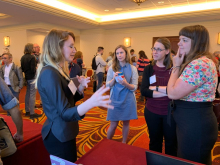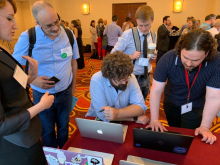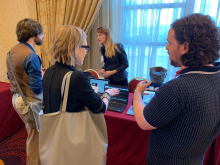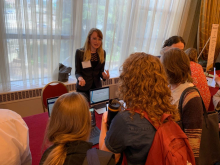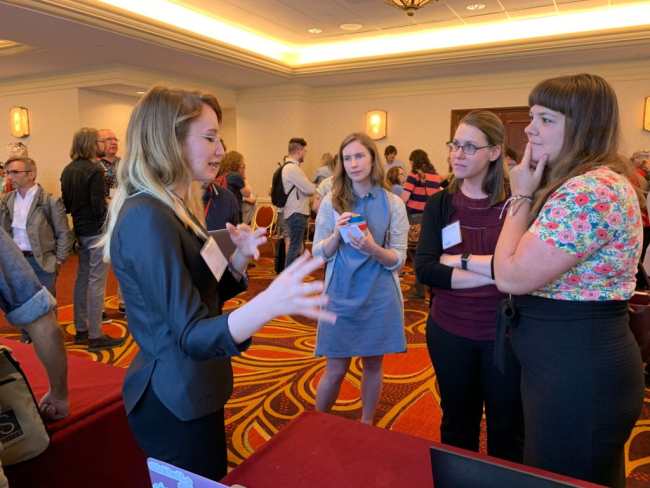
By: Tiamat Fox ('20), Research Assistant, Digital Scholarship
ACH and Mediate
The Association for Computers in the Humanities (ACH) Conference took place at the Marriott City Center in Pittsburgh, PA, July 32-26, 2019. While this conference might seem out of scope for me--an undergraduate studying Psychology and Language, Media, & Communications--I was there to present on work I had done as a teaching assistant for a Language & Advertising course in the fall of 2018 using Mediate: A time-based media annotation tool developed by Digital Scholarship at River Campus Libraries, and the object of focus in our presentation for the conference.
Opening Session
I arrived on Tuesday night and I could already hear the topics of the day buzzing around the lobby on the way to my hotel room. The next morning, it was hard to finish my breakfast with all of my nervous energy about our impending presentation later that day. But first, we had the morning session. In my session, we spoke about the effects of colonization on records of non-imperialist cultures’ information (in accessible languages), how computers can create new-age designs using traditional craft techniques, the importance of recording podcasts for cultural analysis and record-keeping, and finally, the character of “Carol Lane”, created by Shell Oil to give women the encouragement to travel (and therefore spent money at Shell Gas Stations). The presentation on the imperialism of ancient documents archival, told in succession with the presentation on current archival efforts of podcasts, allowed the group to discuss the strategies to overcome the tendency to archive primarily dominant culture. We took a critical look at the process of archiving and how minority products and cultures can fall through the cracks, resulting in less representation and less deserved credit. As a student of the English language and its history (often including reading old manuscripts as points of evidence), it made me wonder what vast amounts of information we don’t know from perspectives other than the dominant culture. What stories, values, languages, dialects, etc. existed but have no trace due to selective archival? It helped to widen my view, understand the context in which we are shown evidence, and question that evidence to a more valuable degree.
Digital Demo
After the first session of the day, we set-up for our digital demonstration session. It was a challenging space as we had four laptops and only half a table, but none-the-less, Emily, Josh, and I (and our lovely table mate) made it work. With our four laptops ready to go, we introduced the conference to Mediate, and people seemed interested in the program and our use cases for the platform. The more I use Mediate and the more I speak to people about their suggestions for use, the more I recognize how innovative and important of a program it is. Editing and commenting on videos is laborious work without a program like Mediate, and our booth’s visitors understood that too. They were so engaged, all three of us were speaking nearly the entire time and we were one of the last demos to leave.
Computers and Storytelling
After lunch, the presentation sessions continued. In the afternoon presentations I learned that video games make for a great storytelling medium with their interactivity and flexibility in design, facilitating art and expression in a new way. Video games combine sound and visuals, while engaging the player on a more personal level, allowing the player to experience another point of view. While it is true that video games have been telling stories nearly since their inception, independent video game making is taking storytelling a step further by using the game as a medium for a story, as opposed to a story being a medium for a game. As I have a background in psychology, I immediately connected this to teaching others about empathy and abnormal psychology. Being able to put someone into the same activities as another—activities that are stylized to express the subjective emotions associated with those activities—is a powerful tool that I could see implemented in a variety of different circumstances and fields. These themes carried into the afternoon sessions about minimal computing and a creative narration of events that took place after the Berlin wall fell, once again using an interactive style of communication. I had a lot to think about with a day of presentations and the demonstration session behind me.
Customers, Commodities, and Communities
The next day, I headed to a session with two of the most interesting, and memorable, speakers of the conference. In this session, we discussed the internet in its current form. With the first speaker, we talked about how internet users are a commodity and how the design of the internet and the need for profit are affecting the problems of privacy that we have today. As I learned when I took the Language & Advertising class as a student, advertising is a fundamental market to the modern economy. Not only that, but businesses are constantly trying to find out what the customer wants, and how the customer behaves, in order to sell to and service the customer better, in addition to knowing how to sell advertising spots and make money. With this ability to access this rich resource of data that the internet provides, it was inevitable for issues of privacy to come to a head in the internet era. It brought up the question of whether businesses should be blamed for looking out for their best interests and how we should work around those interests for optimal combination of privacy, autonomy, products, and services.
The following speaker delved into some modern uses of the internet with respect to the men's rights movements and the online communities of male superiority, particularly ones based around the “Red Pill” and “Incels” philosophies. These communities reflect what is happening in many areas of the internet (largely seen in social media) which are ideological echo chambers with the absence of dissenting views, either due to overt restriction, or invalidation of contrary ideas. In the case of the “Incel” and “Red Pill” reddit groups, the ideological echo chambers manifested themselves in the forms of misogynistic, mechanistic views of women and entitled, empowered views of men. Once in these groups, it’s hard to find outside reasoning and therefore a limited chance to see opposing evidence or theories. This in combination with the previous speaker made me think about the fact that while I appreciate as a user a program responding to my use with more customized content, the role this customization plays in these ideological echo chambers cannot be overlooked. With the internet comes the problems of insufficient or controversial privacy standards and civil discourse, which are the current problems to be explored and examined.
The sessions of the day concluded with conversations about the experiences of the trans community in the American south, digitization of counter culture in Toronto, Canada, and how the economic change and liberalization of women affected sexual harassment and sexual assault in historic Pittsburgh, PA. The last one of these topics sparked an interest for me as it illustrated the way in which human behavior changes due to changing incentives and evolving structures. This has far reaching effects in areas such as economics, psychology, sociology, and law enforcement. Understanding how humans have behaved in the past illustrates possible future behavior, and being able to predict human behavior helps to understand how to make something realistically safe, helpful, and efficient.
What is Digital Humanities?
Throughout the conference a question kept coming to my mind: “what exactly is digital humanities?” This conference showed me that the definition is rather loose and ever-expanding, but it comes down to using digital means to help research and learn about the humanities in different ways. Over the 2+ days I attended the conference I was surrounded with others using new-age digital skills to delve even deeper into the questions of the humanities. It allowed us to expand and explore more than ever before to start to talk about new questions with new ways of talking about them. For example, reddit is helping us learn new concepts about toxic masculinity groups that had surfaced as a reaction to the first wave of feminism and computer programs are integrating with traditional craftsmanship for a wider range of design possibilities. It is exciting to see how the academic landscape is evolving to include a wide range of tools now at our disposal. The conference was a true testament how far humans can reach when given means to do so.

